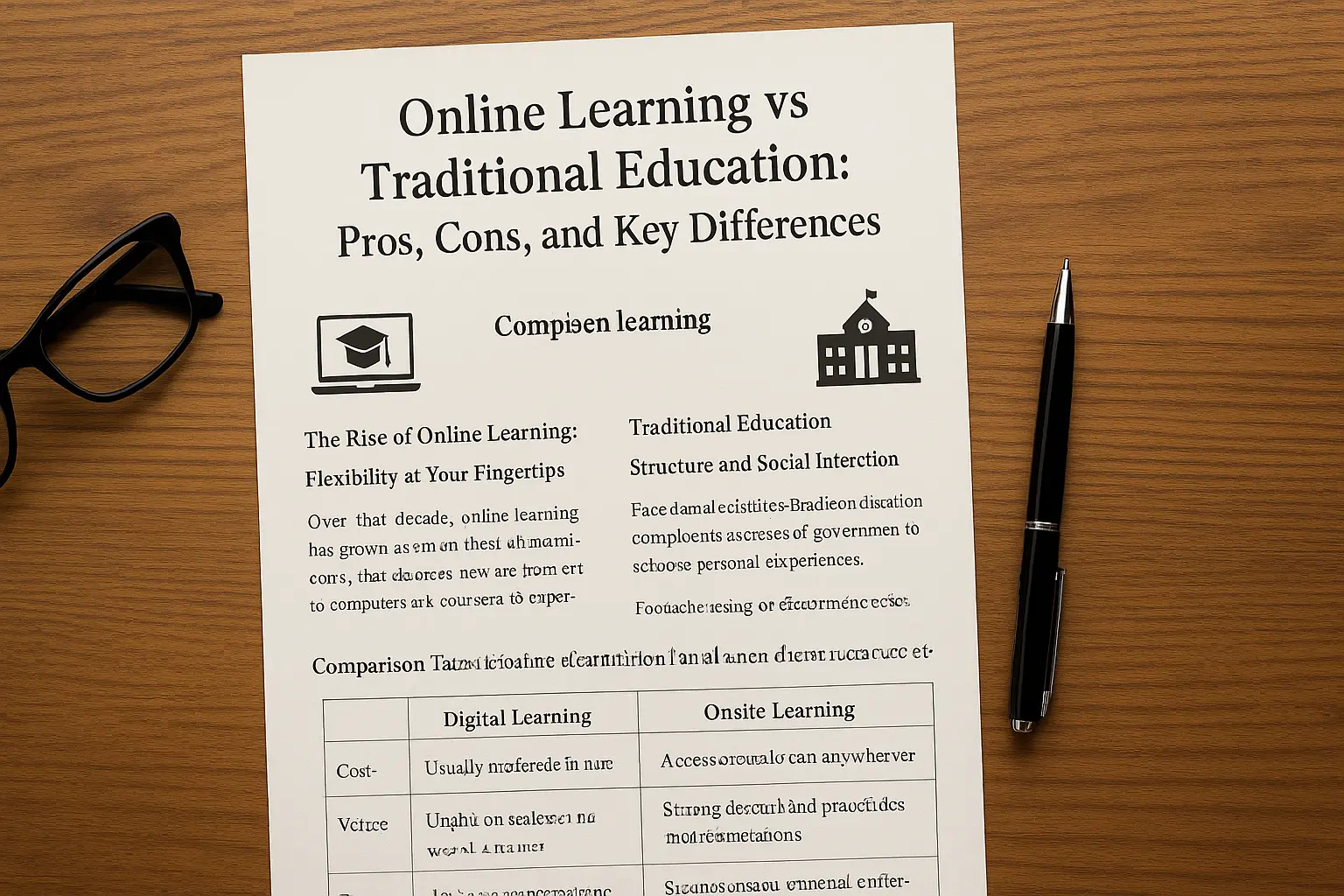In today’s fast-paced world, education is evolving rapidly. With digital platforms becoming more common, learners now face the question of Online learning vs traditional education. Should you choose the flexibility of online courses or stick with the structured environment of a classroom? This article explores both approaches, highlighting their benefits, drawbacks, and the future of education.
The Rise of Online Learning: Flexibility at Your Fingertips
Over the last decade, online learning has grown into a global movement. From Coursera to university programs, students can now study from anywhere. The debate of Online learning vs traditional education is no longer limited to universities — even schools and professional training centers are adopting digital options.
Key Advantages of Online Learning:
- Flexibility: Learn at your own pace.
- Accessibility: Perfect for students in remote areas.
- Affordability: Often cheaper than traditional programs.
Summary: Online courses provide convenience, lower costs, and accessibility, making them a strong alternative to classroom-based programs.
Traditional Education: Structure and Social Interaction
When discussing Online learning vs traditional education, we can’t ignore the strengths of the classic classroom model. Traditional learning builds discipline, face-to-face communication, and hands-on experiences that online platforms sometimes struggle to replicate.
Key Advantages of Traditional Education:
- Human Interaction: Teachers and classmates provide immediate support.
- Structured Routine: Helps learners stay consistent.
- Campus Life: Activities, networking, and community.
Summary: Traditional education offers structure and strong social interaction, which remain valuable even in a digital age.
Online Learning vs Traditional Education: Main Differences
The question “What is the difference between online learning and traditional education?” is one of the most searched worldwide. The differences are clear when you compare flexibility, costs, and interaction levels.
Main Differences:
- Learning Style: Self-paced (online) vs scheduled (classroom).
- Cost: Digital programs are usually more affordable.
- Interaction: Virtual forums vs face-to-face meetings.
Summary: The primary differences lie in cost, flexibility, and social engagement, shaping how learners choose between them.
What Are the Advantages of eLearning vs Traditional Learning?
Another common question is: “What are the advantages of eLearning vs traditional learning?” The short answer is that eLearning opens doors to global opportunities while keeping costs lower.
Advantages of eLearning:
- Worldwide Access: Study with institutions abroad.
- Diverse Choices: Thousands of courses in every subject.
- Learn at Your Own Pace: Customize your learning schedule.
Summary: Compared to traditional classrooms, eLearning is cheaper, more diverse, and globally accessible.
Traditional vs Online Seminars: Key Differences
Seminars are a crucial aspect of higher education. But how do traditional seminars differ from online seminars?
- Traditional Seminars: Students engage in classroom discussions, debates, and group presentations.
- Online Seminars: Learners meet virtually, join breakout rooms, and access recorded content.
Summary: Online seminars emphasize global collaboration and flexibility, while traditional ones highlight in-person interaction.
Traditional vs Modern Learning: The Evolution of Education
The debate of Online learning vs traditional education is part of a bigger shift: the move from traditional methods to modern, tech-driven approaches. Today’s education blends both styles to meet modern needs.
Trends in Modern Learning:
- Technology Tools: AI, simulations, and virtual labs.
- Lifelong Learning: Online certificates for career growth.
Summary: Modern learning combines the benefits of both systems, creating innovative ways to teach and learn.
Strengths and Weaknesses: Comparing Both Models
Every system has strengths and weaknesses. Knowing them helps you make better choices in the Online learning vs traditional education debate.
Online Learning:
- Online Learning Strengths: Accessibility, affordability, flexibility.
- Online Weaknesses: Limited face-to-face interaction, requires self-discipline.
Traditional Education:
- Traditional Education Strengths: Social development, structured environment, strong networking.
- Traditional Weaknesses: Expensive, less flexible, location-based.
Summary: Each model works best for specific learners, depending on lifestyle and goals.
Which Path Is Better in 2025?
So, is online education more effective than traditional learning? Looking ahead to 2025, the best approach might merge both methods instead of picking one. Many institutions now offer hybrid programs, giving students the best of both worlds.
Summary: The future belongs to blended education, where flexibility meets structure.
Conclusion: Online Learning vs Traditional Education
The debate over Online learning vs traditional education isn’t going away. Online platforms bring freedom, affordability, and global access, while traditional classrooms offer structure, personal interaction, and networking opportunities. The best choice depends on your personal goals, schedule, and learning style.
As education evolves, blended learning may become the ultimate solution, combining the strengths of both methods. In the end, whether you choose E-learning vs traditional schooling or a mix of both, the key is finding a path that supports your growth.
Frequently Asked Questions (FAQ)
-
How do Online learning vs traditional education differ in daily experience?
Online learning allows you to create your own study routine from anywhere, while traditional education follows a fixed schedule with face-to-face guidance from instructors.
-
What unique benefits does Online learning provide compared to traditional education?
Online learning offers unmatched flexibility, instant access to global courses, and the ability to balance study with work or personal commitments.
-
Why might someone choose traditional education over Online learning?
Traditional education is ideal for learners who thrive on in-person interaction, structured lessons, and hands-on experiences like labs, workshops, and group projects.
-
How can learners combine Online learning and traditional education effectively?
By blending digital courses with on-campus activities, students can enjoy the freedom of online study while still gaining practical experience and social connections.
-
What does the future hold for Online learning vs traditional education?
The trend is moving toward hybrid models that combine both approaches, allowing students to benefit from flexibility, technology, and personal engagement simultaneously.
